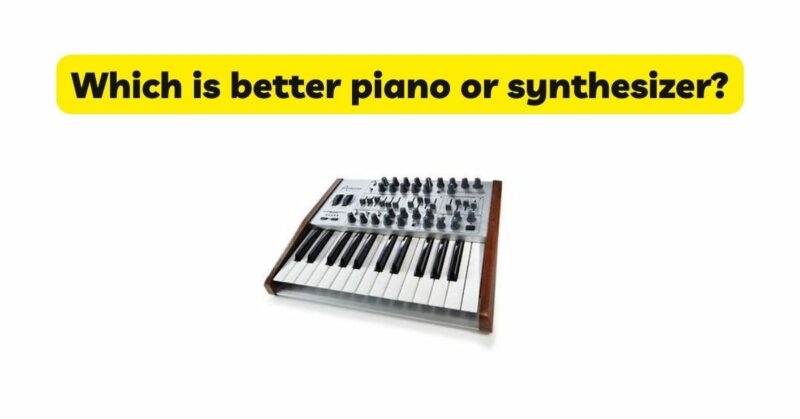When it comes to choosing between a piano and a synthesizer, the decision ultimately depends on personal preferences, musical goals, and the intended use of the instrument. Both the piano and the synthesizer offer unique qualities and capabilities that cater to different musical styles and creative aspirations. In this article, we will delve into the distinctions between pianos and synthesizers, exploring their strengths, limitations, and the factors to consider when deciding which instrument is better suited for individual needs.
I. The Piano: Timeless Elegance and Acoustic Grandeur
The piano, with its rich history and centuries of musical tradition, holds a special place in the hearts of musicians and audiences alike. Its acoustic nature, touch-sensitive keys, and the resonant sound produced by the vibration of strings create a unique playing experience. The piano’s distinct characteristics and attributes make it a preferred choice for certain musical contexts.
- Expressive Range: The piano offers a wide dynamic range and allows for nuanced expression, with the ability to convey a broad spectrum of emotions through touch and finger pressure. The weighted keys of an acoustic piano provide tactile feedback and responsiveness, enhancing the player’s control over dynamics and articulation.
- Tonal Versatility: Pianos encompass a wide tonal palette, ranging from delicate and intimate melodies to powerful and thunderous chords. The instrument’s ability to produce both melodic and harmonic elements simultaneously lends itself to intricate compositions and solo performances.
- Classical and Traditional Music: The piano’s association with classical, jazz, and traditional genres is undeniable. Its role as a staple instrument in orchestras, ensembles, and chamber music makes it an essential choice for those seeking to explore the rich repertoire and techniques found in classical compositions.
II. The Synthesizer: Sonic Exploration and Creative Possibilities
The synthesizer, born out of technological advancements, has revolutionized music production and pushed the boundaries of sonic exploration. It offers a vast array of sounds, textures, and effects, allowing musicians to shape and create unique sonic landscapes. While different types of synthesizers exist, we will focus on the modern electronic synthesizers commonly used today.
- Sound Design Flexibility: Synthesizers excel in sound design, offering virtually limitless possibilities to create and manipulate sounds. With oscillators, filters, envelopes, modulation sources, and various effects, synthesizers allow musicians to craft personalized sounds, from traditional instruments to innovative and otherworldly tones.
- Genre Versatility: Synthesizers are highly versatile and find applications across a broad range of genres, including electronic, pop, rock, and experimental music. Their ability to produce a wide variety of sounds, from lush pads to gritty basslines, makes them suitable for modern and innovative musical expressions.
- Live Performance and Electronic Music Production: Synthesizers provide real-time control and manipulation, allowing for dynamic and evolving performances. The ability to modulate parameters, trigger samples, and create intricate arrangements on the fly make synthesizers indispensable for live electronic music performances and studio production.
III. Considerations for Choosing the Right Instrument
When deciding between a piano and a synthesizer, several factors should be considered based on individual needs, musical preferences, and goals.
- Musical Style and Genre: The musical style or genre one wishes to pursue is an essential consideration. Pianos are deeply rooted in classical, jazz, and traditional genres, while synthesizers find prominence in electronic, pop, and experimental music. Understanding the musical landscape and the instrument’s suitability for a specific genre aids in making an informed decision.
- Personal Expression and Creativity: Consider the type of creative expression and sonic exploration one seeks. Pianos offer expressive capabilities deeply connected to touch and the acoustic nature of the instrument. Synthesizers, with their sound design flexibility and real-time manipulation, allow for boundless creativity and innovation in sound creation and performance.
- Practicality and Accessibility: Assess the practicality and accessibility of each instrument. Pianos, particularly acoustic grand pianos, require space, maintenance, and regular tuning. Synthesizers, being electronic instruments, are more portable, compact, and easily integrated into a home studio or live performance setup.
- Budget and Investment: Consider the financial investment required for purchasing and maintaining each instrument. Pianos, especially high-quality acoustic pianos, can be more expensive and require ongoing maintenance costs. Synthesizers, depending on the type and features, can range in price, with additional expenses for accessories, software, and upgrades.
- Learning Curve and Skill Development: Evaluate the learning curve and skill development associated with each instrument. Pianos require learning techniques, music theory, and reading sheet music, whereas synthesizers involve understanding sound synthesis, programming, and electronic music production techniques. Consider the time, resources, and commitment required to develop proficiency in playing and utilizing each instrument.
Conclusion:
The choice between a piano and a synthesizer ultimately depends on personal preferences, musical goals, and the desired musical experience. Pianos offer timeless elegance, expressive range, and a deep connection to classical and traditional genres. Synthesizers, on the other hand, provide sonic exploration, creative possibilities, and versatility across various genres, particularly in electronic and experimental music.
It is important to understand the unique qualities and limitations of each instrument to make an informed decision. Consider factors such as musical style, personal expression, practicality, budget, and the learning curve associated with each instrument. Both pianos and synthesizers offer distinct experiences and creative potentials, and selecting the right instrument ensures a fulfilling musical journey that aligns with one’s artistic aspirations and preferences.


